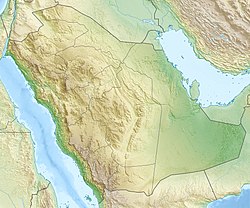|
Imam Turki bin Abdullah Grand Mosque
The Imam Turki bin Abdullah Grand Mosque (Arabic: جامع الإمام تركي بن عبد الله), also known as the Grand Mosque of Riyadh,[1][2] is a Sunni Islam Friday mosque in the ad-Dirah neighborhood of Riyadh, Saudi Arabia, located adjacent to al-Hukm Palace compound, in Deera Square. It was established in the period c. 1830, during the reign of Turki bin Abdullah Al Saud. The mosque was rebuilt in 1992 in Modern Najdi architectural style. Seating 17,000 worshippers and measuring 16,800 square metres (181,000 sq ft), it is one of the largest mosques in Saudi Arabia.[3][4][3] The exterior and upper portion of the interior is primarily brown Arriyadh Limestone[4] which appears golden when lit up at night.[3] The lower portion of the interior is in white marble. The structure includes separate men's and women's libraries,[5] each 325 square metres (3,500 sq ft). The mosque is directly connected from the first floor to al-Hukm Palace via two bridges across as-Safaat Square.[4] HistoryThe mosque was rebuilt in 1992 on the site of a previous grand mosque, that was built sometime between 1826 and 1830 during the reign of Turki bin Abdullah bin Muhammad al-Saud. A Grand Mosque existed on the site for decades but was rebuilt by the Arriyadh Development Authority and reopened in January 1993.[4] ArchitectureDesigned by Rasem Badran in the Modern Najdi style, the mosque was a recipient of the Aga Khan Award for Architecture in 1995.[6] The minarets of the mosque previously featured a mix of Ottoman and Egyptian styles, with two rectangular sections topped by three rounded sections and a top section coming to a point with round shapes atop it. The courtyard porticos rose in a triangular with decor above. The minarets were however rebuilt in rectangular neo-Najdi style, the courtyard completely resurfaced and the porticos are now a modernized version of their former shape.[7] See alsoReferences
External links
|
||||||||||||||||||||||||||||||||||||||||||||||||||

